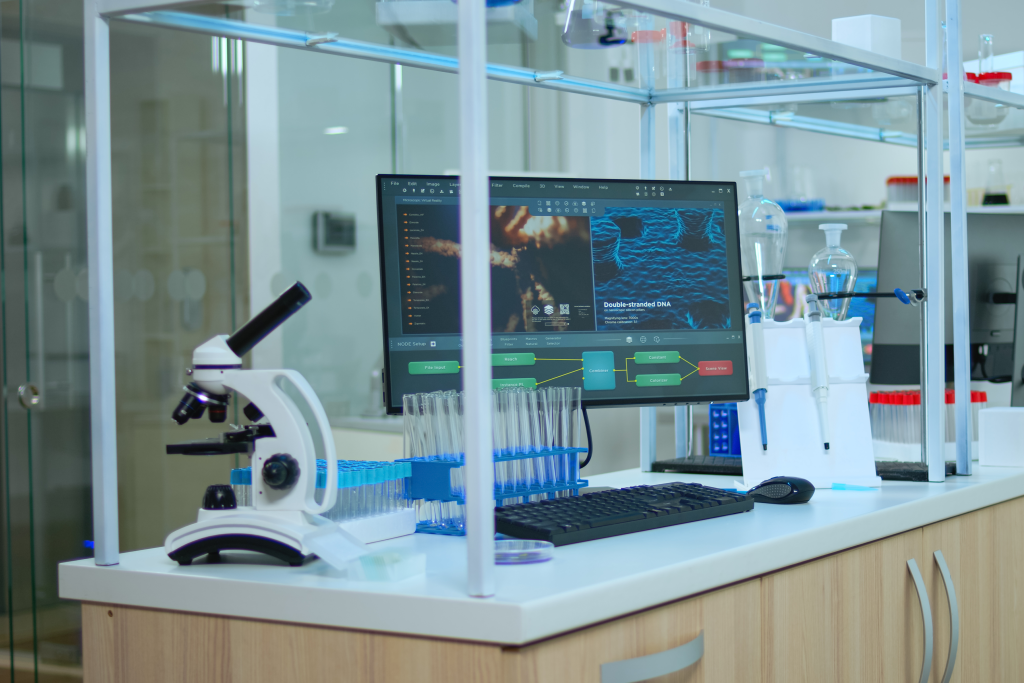Accelerating first-to-market advantage in pharmaceuticals. From regulatory compliance complexity to 15-year development cycles, pharmaceutical companies face unprecedented pressure to innovate faster while maintaining rigorous safety standards. As intelligent automation and AI reshape drug discovery, clinical operations, and regulatory processes, success now depends on embedding technology where it matters most – at the heart of R&D and commercial operations.
The time is now to redefine life sciences operating models and empower teams to make faster decisions without compromising patient safety.

Pharmaceutical companies are operating at the convergence of scientific innovation and digital transformation. The ability to accelerate drug development timelines while managing complex regulatory requirements and maintaining rigorous safety standards has become a defining competitive advantage in the race to bring life-saving treatments to market.
The next phase of industry transformation is being driven by Intelligent Automation (IA) and AI, integrating machine learning, predictive analytics, and automation across key areas of drug development and commercialisation. From AI-powered molecular discovery and automated clinical trial management to intelligent regulatory submissions and predictive manufacturing optimisation, IA enables pharmaceutical companies to operate with unprecedented speed and precision.
Digital workers now support research teams by managing routine tasks – processing clinical data, monitoring adverse events, updating regulatory documentation, generating compliance reports – freeing up scientists and clinicians to focus on breakthrough research, patient safety, and therapeutic innovation. Advanced data analytics platforms surface insights from vast clinical datasets, while cloud-based enterprise systems integration ensures seamless collaboration across global R&D operations.
What sets industry leaders apart is the ability to embed these technologies into the heart of their operating model, not just as add-ons to existing workflows, but as catalysts for competitive advantage. Whether it’s intelligent agents accelerating patient recruitment, AI identifying promising drug candidates in real-time, or automation streamlining regulatory approvals, the opportunity extends beyond efficiency to transformational growth and market leadership.
For pharmaceutical companies, this transformation is no longer optional. As AI-native biotechs emerge and regulatory authorities embrace digital submissions, success will depend on how well organisations can innovate, automate, and act with intelligent speed while maintaining the rigorous standards patients depend on.


Pharmaceutical companies are operating at the convergence of scientific innovation and digital transformation. The ability to accelerate drug development timelines while managing complex regulatory requirements and maintaining rigorous safety standards has become a defining competitive advantage in the race to bring life-saving treatments to market.
The next phase of industry transformation is being driven by Intelligent Automation (IA) and AI, integrating machine learning, predictive analytics, and automation across key areas of drug development and commercialisation. From AI-powered molecular discovery and automated clinical trial management to intelligent regulatory submissions and predictive manufacturing optimisation, IA enables pharmaceutical companies to operate with unprecedented speed and precision.
Digital workers now support research teams by managing routine tasks – processing clinical data, monitoring adverse events, updating regulatory documentation, generating compliance reports – freeing up scientists and clinicians to focus on breakthrough research, patient safety, and therapeutic innovation. Advanced data analytics platforms surface insights from vast clinical datasets, while cloud-based enterprise systems integration ensures seamless collaboration across global R&D operations.
What sets industry leaders apart is the ability to embed these technologies into the heart of their operating model, not just as add-ons to existing workflows, but as catalysts for competitive advantage. Whether it’s intelligent agents accelerating patient recruitment, AI identifying promising drug candidates in real-time, or automation streamlining regulatory approvals, the opportunity extends beyond efficiency to transformational growth and market leadership.
For pharmaceutical companies, this transformation is no longer optional. As AI-native biotechs emerge and regulatory authorities embrace digital submissions, success will depend on how well organisations can innovate, automate, and act with intelligent speed while maintaining the rigorous standards patients depend on.
Extended development timelines - Traditional 10-15 year drug development cycles with high failure rates in clinical trials
Siloed information across R&D, clinical, and commercial functions limiting predictive analytics capabilities
Regulatory compliance complexity - Managing multiple jurisdiction requirements (FDA, EMA, MHRA) while maintaining data integrity standards
Teams concerned about regulatory compliance and data integrity when adopting new technologies
Complex trial management, patient recruitment challenges, and real-world evidence generation gaps
Decision-making bottlenecks - Endless approval loops and unclear accountability structures slowing time-critical processes
Bioprocess optimisation, quality control inconsistencies, and supply chain vulnerabilities

We help pharmaceutical organisations navigate the unique challenges of accelerating drug development while maintaining the rigorous safety and compliance standards that patients depend on. Our team combines deep industry experience from major global biopharmaceutical companies with advanced technology capabilities across clinical operations, regulatory affairs, and R&D transformation.
Our approach recognises that pharmaceutical teams resist new technology not because they oppose innovation, but because they understand the critical importance of regulatory compliance and data integrity. We start by identifying manual, error-prone processes that create genuine bottlenecks – pharma-covigilance reporting, clinical data management, regulatory submission workflows – and demonstrate how intelligent automation enhances safety while accelerating timelines.
We deliver comprehensive solutions spanning intelligent automation for clinical processes, predictive analytics to optimise trial design and patient outcomes, enterprise systems integration across global R&D operations, and cloud migration strategies that enable scalable data platforms while maintaining validation requirements. Our custom solution development capabilities ensure that regulatory-specific tools integrate seamlessly with existing clinical systems, while our ERP expertise helps pharmaceutical companies modernise core operations without disrupting critical compliance processes.
Change management is fundamental to our pharmaceutical programmes because adoption in regulated environments requires building genuine confidence alongside capability. We work closely with clinical teams, regulatory professionals, and R&D leadership to ensure new technologies enhance rather than compromise their ability to deliver safe, effective treatments to patients who need them.


We help pharmaceutical organisations navigate the unique challenges of accelerating drug development while maintaining the rigorous safety and compliance standards that patients depend on. Our team combines deep industry experience from major global biopharmaceutical companies with advanced technology capabilities across clinical operations, regulatory affairs, and R&D transformation.
Our approach recognises that pharmaceutical teams resist new technology not because they oppose innovation, but because they understand the critical importance of regulatory compliance and data integrity. We start by identifying manual, error-prone processes that create genuine bottlenecks – pharma-covigilance reporting, clinical data management, regulatory submission workflows – and demonstrate how intelligent automation enhances safety while accelerating timelines.
We deliver comprehensive solutions spanning intelligent automation for clinical processes, predictive analytics to optimise trial design and patient outcomes, enterprise systems integration across global R&D operations, and cloud migration strategies that enable scalable data platforms while maintaining validation requirements. Our custom solution development capabilities ensure that regulatory-specific tools integrate seamlessly with existing clinical systems, while our ERP expertise helps pharmaceutical companies modernise core operations without disrupting critical compliance processes.
Change management is fundamental to our pharmaceutical programmes because adoption in regulated environments requires building genuine confidence alongside capability. We work closely with clinical teams, regulatory professionals, and R&D leadership to ensure new technologies enhance rather than compromise their ability to deliver safe, effective treatments to patients who need them.
A global biopharmaceutical company’s clinical study teams were trapped in functional silos, with routine decisions taking weeks to navigate approval layers across therapeutic areas, regulatory affairs, and data management. Development timelines were extending by months, threatening competitive positioning in critical therapeutic areas.
Panamoure led a comprehensive operating model transformation, implementing intelligent workflow automation, integrated ERP systems with clinical data platforms, and real-time analytics dashboards.
Digital workers were deployed to handle routine compliance tasks while agile team structures enabled faster decision-making.
The business achieved a 40% reduction in decision cycle times, freed up over 2,000 hours per month in administrative tasks, and reduced average study duration by 6 months.
Cross-functional collaboration improved significantly, and the company gained the agility to accelerate their most promising therapeutic programmes.
